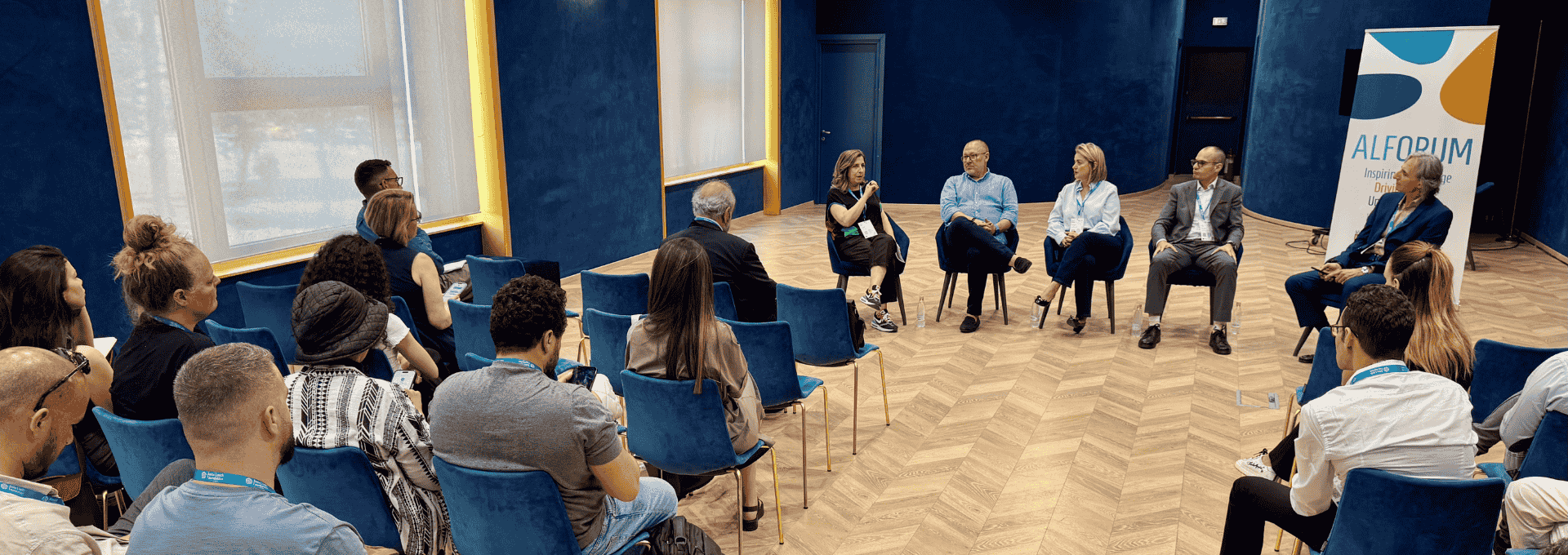

We recently took part in the ALForum 2025 in Tirana, a special and deeply meaningful event for the future of cultural dialogue across the Mediterranean. For us this was another important step toward Matera 2026 – Mediterranean Capital of Culture and Dialogue. It’s a journey we are embracing with passion, responsibility, and a shared vision.
The Anna Lindh Foundation Forum, organized by the Foundation itself—one of the key promoters of the MCCD title along with the Union for the Mediterranean—was hosted in Tirana, the current Capital for 2025, from June 18 to 20. This year’s edition carried a special significance: it marked 20 years of the Anna Lindh Foundation and 30 years since the launch of the Euro-Mediterranean Partnership—two crucial milestones in the effort to build a Mediterranean region grounded in peace, cooperation, and intercultural dialogue.
The Forum unfolded across three symbolic locations in the heart of Tirana: Skanderbeg Square, transformed into a vibrant open space for performances, installations, and public activities; the National Theatre of Opera and Ballet, where the plenary sessions and official meetings took place; and the International Hotel, which hosted a wide range of parallel sessions, working groups, and networking opportunities. In total, there were over 100 thematic sessions, 500 speakers, 90 artists, and 15 artistic performances—a testament to the vibrancy and diversity of the event.
The Forum opened with a moving address by HRH Princess Rym Ali, President of the Anna Lindh Foundation, who reminded us of the Foundation’s role as a bridge between governments, civil society, artists, and citizens. Drawing on her rich background in media and journalism education, she highlighted the transformative power of arts and culture in building more resilient, cohesive societies and stressed how central intercultural dialogue is to the Mediterranean’s future.
Equally powerful were the remarks by Albanian Prime Minister Edi Rama, who spoke about the symbolic importance of hosting the Forum in Tirana. In a world marked by conflict and fragmentation, he reflected on a striking paradox of our time: “While our ability to communicate increases, our ability to listen decreases.” He reminded us of Albania’s own history of isolation and celebrated the richness of Mediterranean diversity as a source of strength. “Diplomacy doesn’t only happen in ministries—it also happens in cafés and schools,” he said. “To lose faith in diplomacy is to lose faith in humanity itself.” His message was clear: “The Mediterranean doesn’t need saving. It needs to be heard.”
During the official session dedicated to the Mediterranean Capitals of Culture and Dialogue, held at the Opera House, we had the chance to present “Terre Immerse”, the cultural programme that will define Matera 2026. Representing our Foundation, Rita Orlando, Head of Programmes and Networks, joined a panel moderated by Elie Melki (BBC Arabic), alongside speakers from Tirana, Alexandria, and Tetouan.
We shared our perspective: that the Mediterranean is not only a sea—it is also its inland territories, its silent landscapes, and its hidden histories. From this belief, we launched a new proposal: the creation of a Mediterranean Cultural Cities Network, bringing together experiences from European, African, and Middle Eastern capitals of culture into a shared cultural geography.
Matera is ready to play its part as Mediterranean Capital of Culture and Dialogue in 2026. With the project ‘Terre Immerse’, we want to give voice to the inland areas of the Mediterranean, to create beauty, foster dialogue, and build new connections in often marginalised regions. From Tirana, we launched a constructive challenge: to unite Mediterranean cultural cities into a stable network of cooperation and exchange.
Being part of the ALForum not only reinforced Matera’s international profile following the success of European Capital of Culture 2019, but also reaffirmed our commitment to positioning the city as a platform for cooperation between Europe, Africa, and the Middle East. We continue our journey, convinced that culture can be the space where transformation begins—and where shared futures take root.